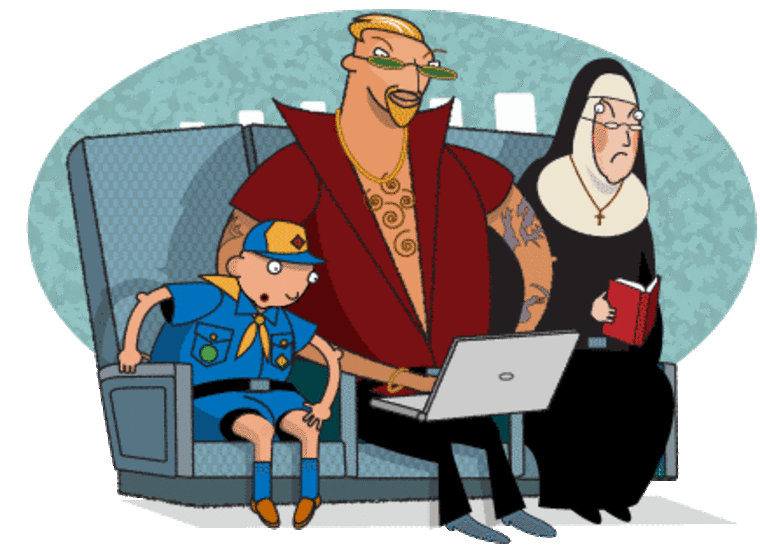At first they demurred, saying the cabin crew could and should handle it.
Then, following the lead of many libraries, schools and workplaces, American Airlines and Delta Air Lines announced that each will ask AirCell, the provider of their in-flight wireless service, to filter the content. The goal: to block passengers from surfing Web sites that may offend those seated nearby.
Will other airlines do the same? And should they? Airlines and many well-mannered travelers are all over the map on this one.
Airlines: Coy or cautious?
After American and Delta issued their formal filtering statements, I checked with some other airlines planning to roll out broadband on their planes.
Southwest Airlines spokesperson Ashley Rogers said while the airline has just begun testing an in-flight Wi-Fi service from provider Row 44, “We will be filtering Internet, much like you have a filter at work.” Continental’s Mary Clark reassured me that while the direct TV system that the airline plans to install in 2009 will have e-mail and messaging capability only, “If we should decide to enhance the system in the future to a broadband application, we would look at filters.”
The decision by American and Delta to filter their in-flight Wi-Fi services hasn’t swayed the folks over at Virgin America, which is set to introduce onboard service next month. Spokesperson Abby Lunardini confirmed that the airline currently does not filter any content on its seatback touch-screen entertainment systems, and that the plan is to extend that non-filtering policy to Wi-Fi.
At Air Canada, which recently announced plans to begin offering broadband on some flights beginning next spring, spokesman John Reber said it was too early to say. Alaska Airlines is also taking a watch-and-see approach. The airline will block voice-over Internet traffic, says airline spokesperson Marianne Lindsey, but for now, “We are not planning on filtering content accessed via the onboard Internet system.” However, she adds, “We are open to filtering in the future.”
For now, Alaska plans to address the issue of “appropriate use” in its service agreement with passengers. “We will place a few key bullets in the terms of service area separate from that standard, boring text,” says Lindsey. “Those bullets will highlight that passengers are to use the system for lawful and appropriate use. Then in the terms, we will define what ‘appropriate’ is. This is not perfect, but it puts the onus on the customer to use the system without being offensive.”
Travelers: Coy or cautious?
As well-mannered travelers know, when it comes to travel, “offensive” is hard to pin down. Some folks consider kids on planes an intrusion. Parents traveling with their children usually do not. It’s the same when the issue of filtering in-flight broadband comes up.
Social media expert and PR stunt planner David Seaman considers the idea of filtering in-flight broadband “completely outrageous, as usual for that industry.” Others can see both sides. Frequent flier Char James says, “The liberal in me says that a choice should be involved ... that the airlines shouldn’t filter the content. The mom in me says that I can’t trust everyone to behave and I don’t want to see porn while flying (and I don’t want my son to see it either), so maybe it would be a good idea.”
It may not matter. Computer consultant David Greenbaum says anyone determined to do so can easily circumvent a filter. For those who can’t foil the filters, though, he’s concerned about what content will get blocked. “In general, the minute you block content you are making a personal decision about what people should or should not access on the Internet and people simply disagree on that issue.”
Yet, as David Hagan, CEO of Boingo — a provider of unfiltered Wi-Fi service in many airports — points out, “People could have pornographic or violent content stored on their laptop or simply bring a magazine on board.”
Shouldn't airports filter, too?
That issue was raised by many folks who read one of my recent columns. A few even wondered if the push to filter in-flight broadband was merely a ploy to protect, or even increase, the sale of adult magazines at airport newsstands.
So I checked around. At first I got the cold shoulder. Then I learned that I wasn’t using the right terms.
“The industry calls them ‘sophisticates,’ not adult magazines,” a spokesperson from a major airport newsstand operator told me, “and they don’t even show up in the top 100 titles we sell.” While a few airports, such as Greenville-Spartanburg International Airport in South Carolina, prohibit all sales of sophisticates, news stands at many airports do sell them — even though these magazines are often required to be placed behind “courtesy covers” that allow only the title of the magazine to be seen.
That’s fine with Frank Bastien. He’s the spokesperson for the Association of Professional Flight Attendants, the American Airlines flight attendants union that pressed American to filter its in-flight broadband service. Asking airports to stop selling sophisticates doesn’t seem to be on the union’s agenda. Perhaps it’s because “someone who buys an adult magazine knows what it is when they open it up,” says Bastien, “but someone surfing the Internet on an airplane may get an e-mail from a friend and not necessarily know what they’re downloading and opening.”
Besides, he says, adult material in “an open magazine is different than on an open 17-inch laptop on an airplane tray table.”
Neither sounds all that sophisticated to me.
Harriet Baskas writes msnbc.com's popular weekly column, The Well-Mannered Traveler. She is the author of the , a contributor to National Public Radio and a columnist for USATODAY.com.
